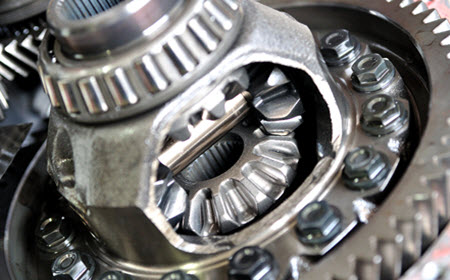The intricate mechanisms that power a Mercedes car come together to create an experience of luxury and performance. Among these, the differential holds a pivotal yet often underestimated role. Responsible for transmitting engine power to the wheels while allowing them to rotate at different speeds, the differential ensures a seamless and controlled drive. However, when this seemingly inconspicuous component encounters issues, the repercussions can be far-reaching, impacting the car’s performance, safety, and longevity.
Understanding the Mercedes Differential and Its Significance
The differential, a sophisticated component nestled within the drivetrain of a Mercedes, is responsible for managing power distribution to the wheels. Its role becomes particularly crucial when the car negotiates turns. The outer wheel covers a greater distance than the inner wheel, necessitating a disparity in rotational speeds.
The differential allows the wheels to rotate independently, enabling this controlled variance in rotation. By doing so, it prevents undue strain on the drivetrain and safeguards tire wear, resulting in a balanced and steady driving experience.
Deciphering the Common Signs of Mercedes Differential Failure
- Audible Whining Noise: One of the initial indications of an impending differential failure is the emergence of a distinctive whining noise. This noise, akin to a high-pitched hum or a persistent whirring sound, is often more pronounced during acceleration or deceleration.
- Unwanted Vibrations: A compromised differential can trigger vibrations that reverberate throughout the car, most notably when making turns. These vibrations are symptomatic of uneven power distribution to the wheels.
- Unusual Clunks or Clicks: Should you detect unfamiliar clunking or clicking sounds, particularly when shifting gears or altering direction, these could serve as early indicators of potential differential troubles.
- Fluid Leakage: The presence of fluid leaks in the vicinity of the rear axle or the differential housing suggests a malfunction in the differential’s seals or gaskets.
The Potential Perils of Disregarding Differential Failure
- Erosion of Control: A differential malfunction can result in erratic power distribution, causing one wheel to lose traction or slip unexpectedly. This compromised traction impacts the driver’s ability to retain control, especially during turns or on slippery surfaces.
- Exacerbated Damage: Ignoring the telltale signs of differential issues can escalate the problem, potentially leading to more extensive damage within the drivetrain and related components. This, in turn, translates into escalated repair costs.
- Diminished Performance: A deteriorating differential can have a cascading effect on the car’s overall performance, encompassing elements such as acceleration, cornering capabilities, and even fuel efficiency.
The Upsides of Timely Differential Maintenance and Repair
- Performance Optimization: Regular maintenance and prompt repairs of the differential ensure its seamless operation. This contributes to the car’s overall performance and its ability to handle a variety of driving conditions.
- Enhanced Longevity: Addressing differential issues in a timely manner can prevent further wear and tear, extending the lifespan of both the differential itself and the connected components.
- Elevated Safety: A well-maintained differential is synonymous with a safe driving experience. It guarantees stable traction and handling, thereby diminishing the likelihood of accidents attributed to a loss of control.
Effective Steps for Resolving Mercedes Differential Problems
- Expert Diagnostic Evaluation: Upon noticing any of the aforementioned signs, it’s crucial to enlist the expertise of a professional mechanic. A qualified technician can perform a comprehensive diagnostic assessment to pinpoint the exact cause of the differential issue.
- Fluid Examination and Replacement: Regularly monitoring and replacing the differential fluid is imperative for its optimal performance. Timely fluid changes prevent contamination and ensure proper lubrication.
- Seal and Gasket Renovation: In instances of detected leaks, it’s essential to replace seals and gaskets promptly. This prevents further fluid loss and safeguards the differential from potential contaminants.
- Complete Differential Substitution: In scenarios where the differential damage is substantial, a comprehensive replacement may be the most viable solution. Opting for a high-quality, compatible replacement component is essential for restoring the car’s performance.
Solve Mercedes Differential Problems
The Mercedes differential might be a concealed element beneath  the car, but its role in maintaining a balanced and controlled drive is unparalleled. Acknowledging the signs of potential differential failure and promptly addressing them are pivotal in ensuring the car’s enduring performance, safety, and overall reliability.
the car, but its role in maintaining a balanced and controlled drive is unparalleled. Acknowledging the signs of potential differential failure and promptly addressing them are pivotal in ensuring the car’s enduring performance, safety, and overall reliability.
If you’re situated in the Seaside, CA area and suspect your Mercedes might be grappling with differential issues, waste no time in reaching out to Marlow Mercedes-Werks. Our team of technicians possesses the knowledge and skills to diagnose, repair, and optimize your Mercedes differential, safeguarding your driving experience and guaranteeing your peace of mind.
 Mon – Fri: 8:00 AM – 5:30 PM | Closed 12:30 PM – 1:30 PM
Mon – Fri: 8:00 AM – 5:30 PM | Closed 12:30 PM – 1:30 PM 684 Ponderosa St, Seaside, CA 93955
684 Ponderosa St, Seaside, CA 93955 831-394-6600
831-394-6600
